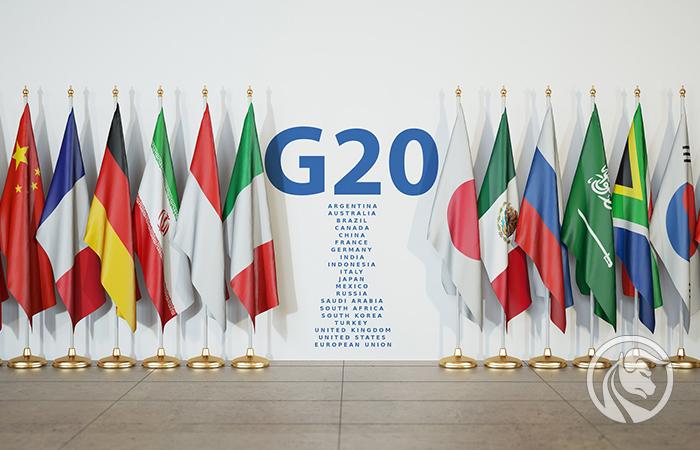Does the group of G20 countries still matter?
The annual G20 summit brings together world leaders in pursuit of a lofty goal: coordinating policy toward the global economy. But how much progress has the G20 made in achieving its ambitions? And what can you expect from this year's meeting in India on Saturday and Sunday?
The agenda in New Delhi covers climate change, economic development and debt in low-income countries, as well as inflation caused by Russia's war in Ukraine. If members manage to reach consensus on any or all of these issues, they will finally present an official joint declaration. What's next? Often not much in terms of real-world results.
Most of the group's joint statements since its inception in 1999 have been dominated by gas-solid resolutions, with no clear consequences in case of underperformance of individual countries.
In one example, at the 2021 Rome Summit, G20 leaders said they would limit global warming with "meaningful and effective actions", emphasizing a commitment to end financing of coal-fired power plants abroad.
However, the announcement omitted domestic coal investments. According to the International Energy Agency, coal-fired electricity production worldwide will reach a new record in 2022. Investment in coal is expected to rise another 10% to $150 billion this year - despite G20 statements and scientific consensus that coal use should be ended immediately.
What has the G20 achieved?
The G20 began with a meeting of finance ministers after a wave of sharp currency devaluations in the late 90s, and ten years later added an annual meeting of world leaders after the global financial crisis.
Senior officials (mainly Germans, Canadians and Americans) urged what they saw as a more flexible and inclusive forum than the Western-led group of 7 Nations, the G7. They believed that convening both established and emerging powers would better protect the world economy, and the first evidence suggested they were right.
Many experts praised the group for stabilizing the financial system in 2008 and 2009, agreeing to spend $4 trillion and implementing banking reforms to rebuild confidence.
The 2016 China summit also demonstrated the power of uniting leaders when the president Barack Obama and Chinese leader Xi Jinping announced that their countries would sign the Paris Climate Agreement.
More recently, in 2021, the G20 supported a major tax change that included a global minimum tax of at least 15% for each country. She also supported new rules that would require large global companies like Amazon to pay taxes in the countries where their products are sold, even if they don't have offices there.
The plan was to increase government revenues by billions and reduce the role of tax havens as the driving force of corporations. However, as with many G20 statements, implementation has been poor.
Why is the G20 struggling to make an impact?
Some critics say the G20 was flawed from the start, with the membership list based on the whims of Western financial officials and central bankers.
For example, Argentina is not an emerging economy nor is it among the 20 largest. Many claim to be a member of the G20 because one of its former economics ministers, Domingo Cavallo, was a Harvard roommate of Larry Summers, the US Treasury secretary from 1999 to 2001.
The group's summits also became a forum for forces countering the order established after World War II. When the G20 began, there was greater consensus on how to hold the world together. Free trade prevailed; the rivalry between the great powers seemed only a memory; and optimists around the world hoped that the G20 would lead to a broader power base for aging institutions such as the UN and MFW extension.
These hopes still exist and are flourishing elsewhere (the most recent example being the recent summit BRICS in South Africa). However, conflicts have replaced the efforts of the G20 team. The United States and China have become fierce competitors. Nationalism has risen as network economies have become much more risky after the Covid-19 pandemic and the war in Ukraine, which drove up food and energy prices in countries far from the front lines.
Does the world need a G20?
Few critics want the G20 eliminated. They fear it is already fading and Xi will miss this year's meeting. (Russian President Vladimir Putin will also not appear.) Many foreign policy experts argue that the failures of the G20 simply point to the need to modernize international institutions.






















![Forex Club – Tax 9 – Settle tax on a foreign broker [Download the Application] Forex Club - Tax 9](https://forexclub.pl/wp-content/uploads/2024/02/Forex-Club-Podatek-9-184x120.jpg?v=1709046278)
![Trading View platform – solutions tailored to the needs of traders [Review] trading view review](https://forexclub.pl/wp-content/uploads/2024/03/trading-view-recenzja-184x120.jpg?v=1709558918)
![How to connect your FP Markets account to the Trading View platform [Guide] fp markets trading view](https://forexclub.pl/wp-content/uploads/2024/02/fp-markets-trading-view-184x120.jpg?v=1708677291)
![CRB index – one of the popular commodity market benchmarks [Guide] crb index](https://forexclub.pl/wp-content/uploads/2024/05/indeks-crb-184x120.jpg?v=1715055656)
![How to invest in ChatGPT and AI? Stocks and ETFs [Guide] how to invest in chatgpt and artificial intelligence](https://forexclub.pl/wp-content/uploads/2023/02/jak-inwestowac-w-chatgpt-i-sztuczna-inteligencje-184x120.jpg?v=1676364263)






![Izabela Górecka – “Success on the market depends not only on knowledge, but also on emotional stability” [Interview] Izabela Górecka - interview](https://forexclub.pl/wp-content/uploads/2024/04/Izabela-Gorecka-wywiad-184x120.jpg?v=1713870578)
![WeWork – the anatomy of the collapse of a company valued at $47 billion [WeWork, part II] wework bankruptcy story](https://forexclub.pl/wp-content/uploads/2024/04/wework-bankructwo-historia-184x120.jpg?v=1711729561)
![Adam Neumann – the man who screwed up Softbank [WeWork, part AND] adam neumann wework](https://forexclub.pl/wp-content/uploads/2024/04/adam-neumann-wework-184x120.jpg?v=1711728724)

![The most common mistakes of a beginner trader - Mr Yogi [VIDEO] Scalping - The most common mistakes of a beginner trader - VIDEO](https://forexclub.pl/wp-content/uploads/2024/03/Scalping-Najczestsze-bledy-poczatkujacego-tradera-VIDEO-184x120.jpg?v=1711601376)
![Learning patience: No position is also a position - Mr Yogi [VIDEO] Scalping - Learning patience - No position is also a position - VIDEO](https://forexclub.pl/wp-content/uploads/2024/03/Scalping-Nauka-cierpliwosci-Brak-pozycji-to-tez-pozycja-VIDEO-184x120.jpg?v=1710999249)
![When to exit a position and how to minimize losses - Mr Yogi [VIDEO] Scalping - When to exit a position and how to minimize losses - VIDEO](https://forexclub.pl/wp-content/uploads/2024/03/Scalping-Kiedy-wyjsc-z-pozycji-i-jak-minimalizowac-straty-VIDEO-184x120.jpg?v=1710336731)
















